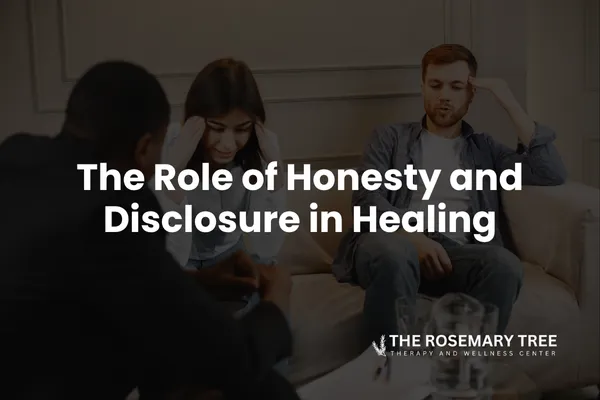
The Role of Honesty and Disclosure in Healing
Why Truth Matters More Than Perfection
When trust has been broken, honesty is the foundation on which all healing rests. Without it, even the most heartfelt apologies cannot last.
But truth must be handled gently. The goal is not to expose every detail out of guilt or anger, but to create clarity, safety, and a shared understanding of what really happened.
Many couples rush disclosure because they want the pain to be over quickly. Unfortunately, that often leads to more trauma. Real honesty requires preparation, timing, and support.
The Difference Between Honesty and Overexposure
Telling the truth is necessary. Overexposing details, however, can cause further harm. The betrayed partner has already experienced a rupture of safety, and hearing shocking or graphic information too soon can trigger panic or withdrawal.
Safe disclosure means sharing everything essential for rebuilding trust, but doing it in a contained, respectful way. It allows for honesty without chaos.
Why Betrayed Partners Need Structure
For the betrayed partner, the need to know is often overwhelming. Questions flood the mind: When did it happen? How long? Why? This desire for truth is valid, it’s the brain’s way of trying to regain control.
But without guidance, disclosure can turn into interrogation. This only deepens fear and confusion.
Structured honesty, done in the presence of a trauma-informed therapist, helps ensure that information is delivered with care and that both partners feel supported throughout the process.
Why the Unfaithful Partner Must Lead with Integrity
For the partner who caused the betrayal, disclosure is not just about telling the truth; it is about showing accountability.
That means being open without minimizing or defending, listening to pain without self-protection, and recognizing that honesty is an act of repair, not a performance of guilt.
Real accountability looks like:
Answering questions calmly when your partner is ready
Acknowledging the impact of your choices
Resisting the urge to rush forgiveness
Committing to total transparency moving forward
How to Create a Safe Environment for Disclosure
Disclosure should never happen in the heat of argument or without emotional preparation.
Before sharing or hearing difficult truths, both partners should:
Ground themselves through breathing or short pauses
Choose a calm, private space
Set time limits so the process does not become overwhelming
Have access to professional support before and after
This kind of preparation helps the nervous system stay regulated so both people can remain emotionally present.
How Therapy Intensives Support This Process
Our Accelerated Deep-Work Therapy Intensives are designed for the depth and complexity that safe disclosure requires.
During an intensive, couples can:
Prepare emotionally and physically for difficult conversations
Share the truth in a guided, contained environment
Process the emotions that arise in real time with professional support
Begin creating new agreements rooted in honesty and transparency
These extended sessions prevent re-traumatization and allow couples to experience honesty not as destruction, but as the first step toward rebuilding.
When You’re Afraid of What the Truth Might Do
It’s natural to fear that honesty will destroy the relationship. But in reality, secrecy has already done that work. Truth, when offered with care, becomes the pathway to healing.
The process may be painful, but it also brings relief. You no longer have to guess, hide, or carry unspoken stories. Clarity creates the possibility of real connection again.
Final Thoughts
Honesty is not a single conversation; it is a practice of integrity over time. Safe disclosure gives both partners the chance to understand what happened and begin building a new foundation based on truth, not illusion.
If you are ready to begin this process, we would be honored to help. You can reach out to us here, and our team will connect with you to talk about what this process could look like. There is no pressure, only care and a safe space to begin again.


